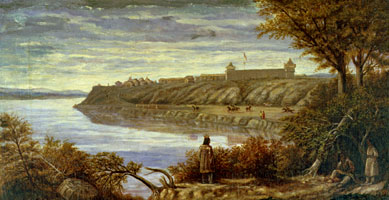
Detrobriand Painting of Fort Berthold SHSND# 12468By 1873, Dakota’s military posts usually had gardens to provide fresh vegetables for the enlisted men and officers. Colonel G. A. Custer referred to the garden at Fort Abraham Lincoln and General W. B. Hazen ordered soldiers to garden at Fort Buford. Both officers made reference to the vegetables grown at their posts in an exchange published in several national newspapers. Their quarrel had two important points. The first question was whether the land sales advertising conducted by the Northern Pacific Railroad (NPRR) was fraudulent. The second and related question was whether the climate of the northern portion of Dakota through which the rails would run would support modern agriculture. Since neither post practiced extensive agriculture, but could only claim knowledge of vegetable horticulture and crops of prairie hay cut and transported to the posts under contract, the arguments boiled down to a matter of vegetables and climate charts.
Hazen fired the first shot in a letter which was published in the New York Tribune on 27 February 1874 (republished in Stewart, Penny-an-Acre-Empire, pp 35 - 52). He asserted that the northern Great Plains would never support farm families and that those who purchased NPRR lands for the purpose of general farming would inevitably fail. In his years on the plains, he found the area to be plagued by extreme cold in the winter and drought in the summer. The soil, he stated, could only be cultivated by irrigation. Locating the post garden on the banks of the Missouri River, gardeners in uniform had produced “potatoes, native corn, cabbage, early sown turnips, early peas, early beans, beets, carrots, parsnips, salsify, cucumber, lettuce, radishes and asparagus” in the summer of 1873 which he noted was a very good, if unusual, year for rainfall.




